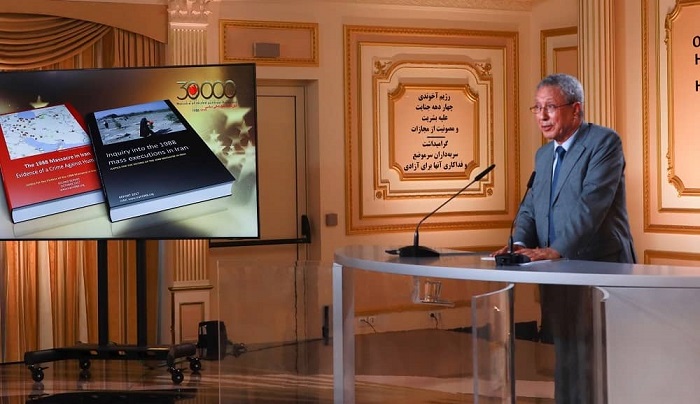
The National Council of Resistance of Iran (NCRI) hosted an international conference on August 21, addressing the political prisoner massacre that transpired in Iran during the summer of 1988. Held near Paris, the event attracted several eminent personalities.
Among them was Mr. Tahar Boumedra, the former Chief of UNAMI Human Rights Office in Iraq (2012), and now the Director of the Justice for the Victims of the 1988 Massacre in Iran (JVMI).
Mr. Boumedra spoke at length about the flagrant human rights abuses he witnessed while serving as the UNAMI Human Rights Office Chief. “My experience is very hard in Camp Ashraf,” he began, recalling the tragic events that occurred under the watch of the pro-Iranian regime government in Baghdad.
He cited specific instances during his tenure when the government, under the leadership of Nouri al-Maliki, subjected political refugees in Camp Ashraf to dire conditions. “What I personally witnessed is that a government decides to starve a population and they do it under the supervision of the United Nations,” Mr. Boumedra revealed. He detailed the government’s appalling tactics, such as halting food convoys, subjecting provisions to extreme heat to ensure spoilage, and even diverting water contaminated with depleted uranium into the camp.
The adverse effects of these acts were evident as the health of Camp Ashraf’s inhabitants deteriorated. “And then people get sick. They need medical care,” Mr. Boumedra noted, expressing his frustration over the bureaucratic hurdles faced when trying to secure medical attention for the ailing. He remembered instances where it took over a month to get a single individual from the camp to a hospital, with some tragically passing away before receiving the required care.
Maliki secretly buried 52 bodies of #Ashrafmassacre, 2 destroy evidence of crime against humanity #Freethe7 #Iraq pic.twitter.com/JKJ7TEBlRZ
— shahriar kia (@shahriarkia) September 1, 2015
In his moving address, Mr. Boumedra stressed the importance of acknowledging these actions for what they are – crimes. “We don’t need a Ph.D. to recognize this is a crime, starving a population,” he iterated. He applauded the efforts of the JVMI, mentioning the two reports they’ve published, which identify over 70 individuals involved in the 1988 massacre.
He concluded his speech by urging human rights organizations to focus on gathering and documenting facts, rather than getting entangled in categorizing these crimes. “I think human rights organizations should work on this base,” he said, pointing out that the Swedish court in Stockholm had utilized JVMI reports, showcasing the organization’s credibility.
New details on #campAshraf hostages detained by Maliki in #Iraq http://t.co/8NpDHwqKO3 #freethe7 @HI_Centre @chavezlinda
— shahriar kia (@shahriarkia) November 12, 2013
The conference served as a reminder of the gravity and extent of the atrocities committed and reinforced the necessity of international collaboration to ensure justice for the victims.

MEK Iran (follow us on Twitter and Facebook), Maryam Rajavi’s on her site, Twitter & Facebook, NCRI (Twitter & Facebook), and People’s Mojahedin Organization of Iran – MEK IRAN – YouTu
